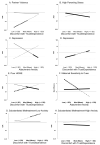Examining maternal depression and attachment insecurity as moderators of the impacts of home visiting for at-risk mothers and infants
- PMID: 19634970
- PMCID: PMC2718774
- DOI: 10.1037/a0015709
Examining maternal depression and attachment insecurity as moderators of the impacts of home visiting for at-risk mothers and infants
Abstract
Home visiting programs for at-risk mothers and their infants have proliferated nationally in recent years, yet experimental studies of home visiting have yielded mixed findings. One promising strategy for explicating the effects of early home visiting is to examine moderators of program impacts. This study assessed the roles of maternal depression and attachment insecurity as moderators of the impacts of Healthy Families Alaska home visiting services for at-risk mothers and their infants. At-risk families (N = 325) were randomly assigned to home visiting or community services as usual (n = 162 and 163, respectively). Maternal depression and attachment insecurity (attachment anxiety and discomfort with trust/dependence) were measured at baseline. Maternal psychosocial and parenting outcomes were measured when children were 2 years old via maternal self-report, observation, and review of substantiated reports of child maltreatment. Maternal depression and attachment insecurity interacted in their moderation of program impacts. For several outcomes, home visiting impacts were greatest for nondepressed mothers with moderate-to-high discomfort with trust/dependence and for depressed mothers with low discomfort with trust/dependence. Implications for practice and policy are discussed.
Figures

References
-
- Abidin RR. Parenting Stress Index Short Form Test Manual. Pediatric Psychology Press; Charlottesville, VA: 1990.
-
- Administration for Children and Families . Making a difference in the lives of children and families: The impacts of Early Head Start Programs on young children and their families. US Department of Health and Human Services; Washington, DC: 2002.
-
- Aiken LS, West SG. Multiple regression: Testing and interpreting interactions. Sage; Newbury Park, CA: 1991.
-
- Alterman AI, McDermott PA, Cook TG, Cacciola JS, McKay JR, McLellan AT, et al. Generaliziability of the clinical dimensions of the Addiction Severity Index to nonopioid-dependent patients. Psychology of Addictive Behaviors. 2000;14:287–294. - PubMed
-
- Barnard K. The Nursing Child Assessment Satellite Training (NCAST) Teaching Scale. University of Washington, School of Nursing; Seattle, WA: 1994.

